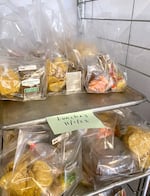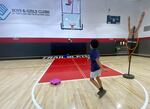Thursday is pizza day at Grout Elementary School in Southeast Portland. But this Thursday, nutrition services staff sat outside passing out a different lunch: peanut butter and jelly sandwiches.
It’s day two of the Portland teachers strike, and day two of grab and go meals at sites across the city as schools remain closed.
Donna Webb, the nutrition services lead at Grout, said on Wednesday, the first day of the strike, they passed out 56 bags of breakfast and lunch to students and families.

Nutrition service workers at Grout Elementary School in Southeast Portland keep track of how many breakfast and lunches they pass out to students. School sites across the city will have breakfast and lunch for students Tuesday through Thursday until the strike ends.
Elizabeth Miller / OPB
Thursday, things were a little slower. An hour into service, staff had passed out 26 meals.
“It kind of reminds you of COVID times when you did all that,” Webb said, referencing the months in 2020 and 2021 when schools were shut down and students picked up their meals before going back home to log on for distance learning.
During COVID-19, schools and nonprofit organizations stepped up to provide services and resources for kids and their families while schools were closed. With the strike, they’re stepping up again, though with more uncertainty about how long the strike will last — and how long these resources will be needed.
Support for teachers and grateful for resources
At Lent Elementary, also in Southeast, staff called out to a couple walking down the street with a stroller.
“Hello! We have some free lunches for kids!”
Several families took them up on that, including Omar Santos and his two kids. His youngest started attending Lent this year.
“I’m supportive of the teachers,” Santos said. “We’re doing pretty good, especially with the food, it helps, and then I’ve been doing some homeschooling, some small exercises, nothing too big.”
Both Santos and his wife have been home with the kids; Santos is a stay-at-home dad, and his wife works from home.

At Lent Elementary, grab and go lunches are available for youth ages 1-18 Tuesdays through Thursdays from 11:30-1. Several schools around the city will offer meals until the strike ends.
Elizabeth Miller / OPB
Dagoberto Flores and his grandson Matthew stopped by Lent a little later. Flores initially dropped by his grandson’s school thinking there’d be teachers rallying outside. He wanted his grandson to see.
“It’s an event, I wanted my grandson to be aware that those events happen in society,” he said.
At lunchtime at Lent, there weren’t any picket lines, so Matthew picked up breakfast and lunch.
Flores said his grandson has spent the last couple of days playing with his grandparents and a neighbor who also doesn’t have school. And while he isn’t aware of the specifics of the negotiations between teachers and the school district, Flores expressed support for staff educating his grandson and other children.

Lent Elementary School in Southeast Portland on Nov. 2, 2023. Lent is one of several Portland schools offering meals to students during the teachers strike.
Elizabeth Miller / OPB
“Education is a very important aspect of society,” he said. “If we do not educate our children, what is society going to be when we’re older?”
“I think teachers are asking for something they deserve and I support even though I do not know the specifics, the details,” he said.
Organizations offering up services in a contentious time
Nonprofit organizations across Portland are opening their doors to students, offering whatever they can to keep students occupied during the day while recognizing two factors: they don’t know when the strike will end and their programs are not a replacement for school.
Portland Metro Arts, a nonprofit organization, usually offers summer camps, so they already have a curriculum for their arts-based programming. But Portland Metro Arts’ Diane Wallinger said they usually have months to hire staff and prepare for summer.
This week, they’ve started offering full-day care for students at $60 a day, providing instruction in the performing arts and allowing students to bring in their school work, or books they’re reading. But they can only take so many students.
“We have more demand than we can support,” Wallinger said.
Wallinger said the program can support about 30 to 35 students.
Portland Parks & Recreation’s options are limited based on “facility size and staffing,” read a summary of offerings from Public Information Officer Mark Ross.
Portland Parks and Recreation has a focus “on enrichment, not as a substitute for school.”
That includes the organization’s TeenForce program for youth ages 10-20. TeenForce operates year-round and requires a pass, but it’s free.

Young people play pool at the Blazer Boys & Girls Club in Northeast Portland. Along with the Urban League of Portland and REAP, the organization is hosting programming during school hours for students attending neighborhood schools affected by the Portland teachers strike.
Elizabeth Miller / OPB
Organizations are also navigating the contentious back and forth between Oregon’s largest school district and its teachers union.
The Blazers Boys & Girls Club, part of the Boys and Girls Club of Portland Metropolitan Area, is partnering with the Urban League of Portland and REAP to provide a free, daylong space Tuesday through Thursdays for students attending neighborhood schools.
“As that negotiation process is playing out, our focus is to make sure that families who are impacted by the strike have somewhere for their kids to go, and also have access to food,” said Boys and Girls Club of Portland CEO Terry Johnson.
On Thursday afternoon, some students played pool in the organization’s main area, while others took up basketball in the gym.
“What we’re doing during the school hours in this club is bringing in partners who normally operate on school campuses to serve the kids that they’d normally be serving during school,” Johnson said.

A student plays basketball at the Blazers Club in Northeast Portland, one of the Portland Boys & Girls Club sites. Officials with the Boys & Girls Club of Portland want the space to be a community hub, where students can safely spend time and have access to meals while schools are closed.
Elizabeth Miller / OPB
The all-day offering is in addition to afterschool programs the organization usually provides to students. Johnson said they’ve expanded what they offer over the last couple of years, focusing on things like reading and financial literacy.
Thursday, Johnson said about 40 students showed up to the building during school hours, and about 120 showed up for the afterschool program, which runs Monday through Friday.
“We’re going to be there 100% of the way in making sure that kids have access to a safe, positive, and transformative programming throughout the duration of the strike,” Johnson said. “This is just who we are, and we’re built for it.”
You can find locations for PPS meals here.
Correction: The title for Diane Wallinger of Portland Metro Arts was incorrect in an earlier version of this story. OPB regrets the error.
